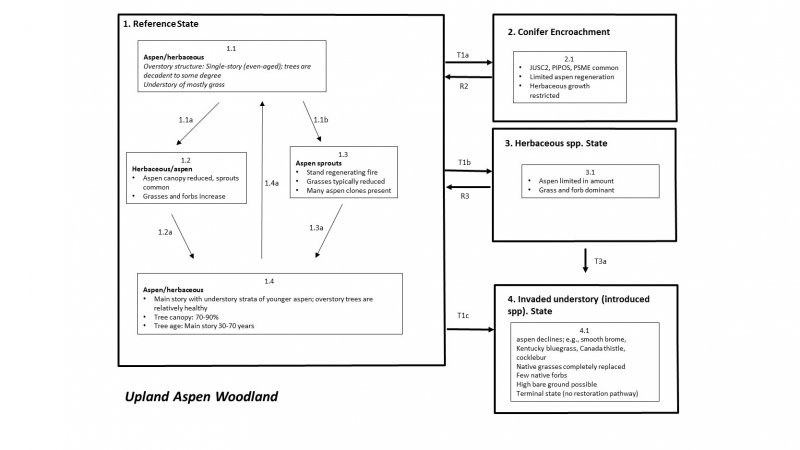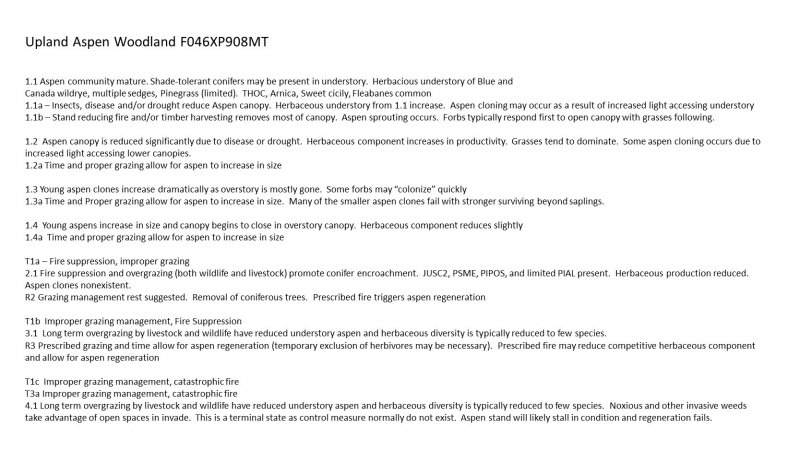
Natural Resources
Conservation Service
Ecological site F046XP908MT
Upland Aspen Woodland Group
Last updated: 9/07/2023
Accessed: 02/12/2026
General information
Provisional. A provisional ecological site description has undergone quality control and quality assurance review. It contains a working state and transition model and enough information to identify the ecological site.
MLRA notes
Major Land Resource Area (MLRA): 046X–Northern and Central Rocky Mountain Foothills
The Provisional ESD Initiative was established to expedite the development of ecological site descriptions through the development of provisional ESDs. While Provisional ESDs are not complete, the intent is to produce an ESD complete enough for land managers to use while approved ESDs are being developed.
This project area has mixed ownership falling primarily under private ownership or lands managed by the Blackfeet Nation. This PES project is contained within MLRA 46. Major Land Resource Area (MLRA) 46, Rocky Mountain Foothills, is approximately 11.6 million acres. MLRA 46’s extent has changed over recent years and is now primarily located in Montana and Wyoming with limited acres in Utah and Colorado. It spans from the Canadian border south to the Uinta Mountains of Northwest Colorado. MLRA 46 is a transitional MLRA between the plains and mountains of primarily non-forested rangeland. In Montana, 3 LRUs exist based on differences in geology, landscape, soils, water resources, and plant communities. Elevations for this MLRA in Montana vary from a low of 3200 to 6500 feet (975 to 1981 m) however the elevations on the fringes of this MLRA may fall outside of that range in extremely small isolated areas where the boundaries between LRU C and MLRA 43B LRU G are not easily defined. Annual precipitation ranges from 8 inches (254 mm) to, in very isolated areas, 42 inches (1083 mm). In general precipitation rarely exceeds 24 inches (610mm). Frost-free days are variable from 50 days near the Crazy and Beartooth Mountains to 130 days in the foothills south of the Bear’s Paw Mtns of Central Montana. The geology of MLRA 46 is generally Cretaceous and Jurassic marine sediments
MLRA 46’s plant communities are dominated by cool season bunchgrasses with mixed shrubs. This MLRA is rarely forested however Ponderosa and limber pine do occupy areas. Portions of this MRLA may have a sub dominance of warm season mid-statured bunchgrasses like little bluestem, however the general concept of the MLRA does not have a large component of warm season species. Wyoming big sagebrush, Mountain big sagebrush, silver sagebrush, and shrubby cinquefoil tend to be the dominant shrub component. The kind and presences of shrubs tends to be driven by a combination of soils and climate. Due to the variable nature of the Land Resources Units, Climatic subsets will be necessary to describe the ecological sites and the variation of plant communities for this MLRA.
Ecological site concept
• Site does not receive any additional water
• Dominant Cover: Deciduous Forest
• Soils are
o Generally not saline or saline-sodic (limited extent)
o Moderately deep, deep, or very deep
o Typically less than 5% stone and boulder cover (<15% max)
• Soil surface texture ranges from sandy loam to clay loam in surface mineral 4”
• Parent material is alluvium
• Site landforms: Hillslopes
• Transitional area of foothills separating plains and mountains
• Moisture Regime: ustic
• Temperature Regime: frigid to cryic
• Elevation Range: 3500-5800
• Slope: 5-15%
Associated sites
| F046XP911MT |
Upland Warm Woodland Group The Upland Warm Woodland shares landscape position with the Upland Aspen Woodland |
|---|
Similar sites
| F043BP908MT |
Upland Aspen Woodland Group The Upland Aspen Woodland sites in 43B are similarly structured however have distinctly different vegetation communities |
|---|
Table 1. Dominant plant species
| Tree |
(1) Populus tremuloides |
|---|---|
| Shrub |
(1) Symphoricarpos albus |
| Herbaceous |
(1) Elymus glaucus |
Click on box and path labels to scroll to the respective text.

